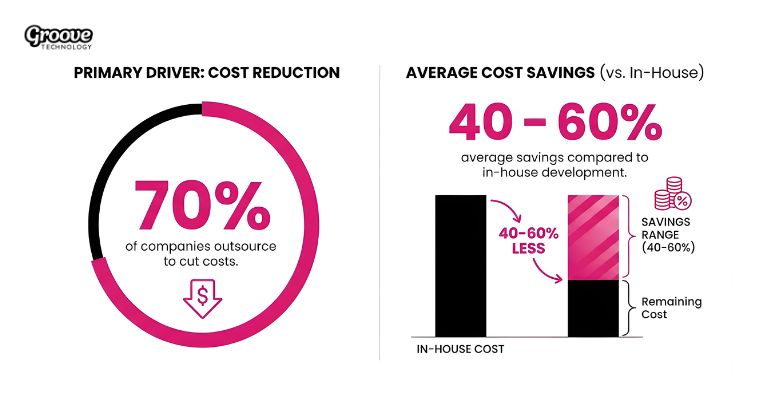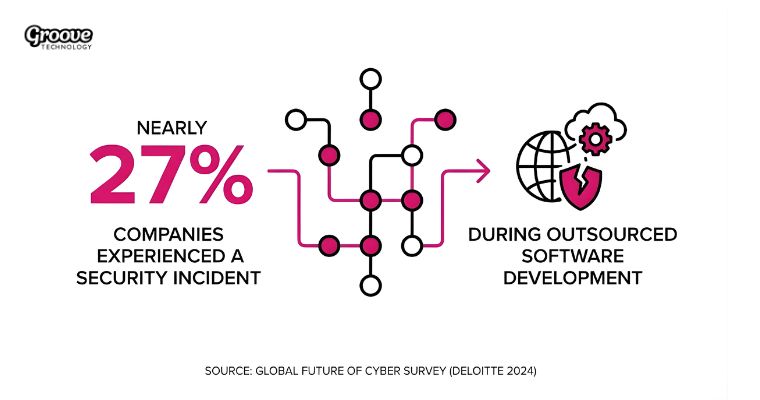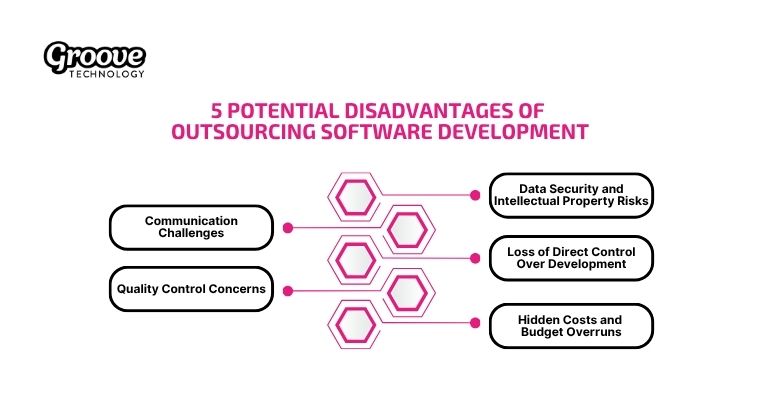12 Key Pros And Cons Of Outsourcing Software Development In 2026
In today’s rapidly evolving digital landscape, understanding the advantages and disadvantages of outsourcing software development is essential for businesses striving to remain competitive. Software development drives innovation, enhances operational efficiency, and improves customer experience, but maintaining an in-house team that can keep up with technology and market shifts often comes with high costs and complexity.
Outsourcing has become a strategic solution, allowing companies to reduce expenses, access global talent, and accelerate time-to-market. According to Deloitte, 59% of organizations outsource primarily to lower costs, while others do so to gain specialized expertise. The global IT outsourcing market is projected to reach $1.149 trillion by 2032, highlighting the growing reliance on external development partners to drive digital transformation.
However, outsourcing is not without its challenges. Communication gaps, quality control issues, and data security risks remain major concerns. With the right partner selection, clear communication frameworks, and effective project management, companies can overcome these barriers and fully capitalize on outsourcing’s benefits. This guide explores the outsourcing software development advantages and disadvantages, offering practical insights for CTOs, Product Managers, and business leaders seeking to balance innovation, efficiency, and risk in today’s competitive tech environment.

1. 12 Key Benefits of Outsourcing Software Development
In today’s competitive landscape, businesses are under constant pressure to innovate faster and operate efficiently. Outsourcing software development work has emerged as a strategic solution, enabling companies to reduce costs, access global expertise, and enhance overall productivity. Below are 12 major advantages that make outsourcing a valuable business decision.
1.1. Reduces Development Costs
Outsourcing allows companies to significantly reduce outsourcing software development cost without compromising quality. By leveraging developers from regions with lower labor costs, businesses can achieve substantial savings. According to Statista (2024), about 70% of companies outsource to cut costs, saving an average of 40 – 60% compared to in-house development. This cost-efficiency can significantly reduce operational and development costs in several ways:
- Lower labor costs: Outsourcing allows companies to take advantage of lower labor rates in regions with decreased living costs. For example, Eastern European developers may charge $25-50 per hour, which is often much less than rates in North America or Western Europe.
- Reduced overhead expenses: Outsourcing eliminates the need for companies to invest in infrastructure, office space, equipment, and software licenses for an in-house team. The outsourcing provider typically assumes responsibility for these aspects.
- Avoiding recruitment and training costs: Companies can sidestep expenses associated with recruiting, hiring, and training new employees. This is particularly beneficial for specialized skills that may be difficult or expensive to find locally.
- Flexible resource allocation: Outsourcing allows businesses to scale resources up or down based on project needs, converting fixed costs into variable costs. This provides financial flexibility, especially for companies with fluctuating development requirements.
- Eliminating employee benefits costs: When outsourcing, companies don’t need to pay for employee benefits, health insurance, paid time off, and other perks associated with full-time employees.
- Access to established processes: Outsourcing partners often have well-established development processes and methodologies, which can lead to more efficient project management and faster delivery times. This can result in cost savings through improved productivity and highlights a key advantage of outsourcing software development.
- Reduced management overhead: Outsourcing can decrease the need for an expanded managerial layer to oversee additional in-house development teams, leading to management savings.
- Pay only for work completed: When outsourcing IT functions, consumers typically pay only for the work completed and the outcome rather than ongoing salaries, regardless of workload.

1.2. Provides Access to World-Class Talent
One of the major advantages of outsourcing software development is access to a global talent ecosystem. Businesses can collaborate with top-tier engineers from global tech hubs like Bangalore, Warsaw, or Ho Chi Minh City, gaining access to skills often unavailable locally.
Gartner (2023) notes that leading companies such as Google and Slack leverage outsourcing to accelerate innovation in AI, Blockchain, and Cloud. Beyond technical skills, cross-cultural collaboration fuels creativity and diverse problem-solving approaches, further amplifying the software development outsourcing benefits.
1.3. Saves Time in the Hiring Process
Among the key outsourcing software development advantages is faster team deployment. Hiring skilled developers internally can take over 40 days (Glassdoor, 2023). In contrast, outsourcing providers like Groove Technology maintain pre-vetted teams ready to join your project within a few business days.
This dramatically shortens time-to-hire, enabling faster product launches and giving companies a competitive edge in time-sensitive industries like Fintech and E-commerce.

1.4. Enhances Flexibility and Scalability
Business demands fluctuate and so should your development team. This is why outsource software development offers unmatched flexibility, enabling you to scale your team up or down depending on project requirements. Whether you need to ramp up for a major initiative or reduce head-count during quieter periods, outsourcing gives this agility without the long-term commitments of full-time hires.
For example, an e-commerce brand may expand its development team during the holiday season and reduce it afterward. This dynamic adaptability showcases one of the most practical advantages outsourcing software development brings to modern organizations.
1.5. Improves Risk Management
Every software project faces risks such as delays, skill gaps, or data vulnerabilities. Outsourcing distributes these risks by partnering with vendors who follow ISO 27001, GDPR, and industry-specific security protocols.
Top-tier outsourcing firms also implement:
- Multi-layer data backups.
- Dedicated cybersecurity teams (SOCs).
- Detailed risk management frameworks.
Some enterprises go further by adopting multi-vendor strategies to ensure redundancy and continuity, even in complex projects.
1.6. Expert Domain Knowledge
Another of the notable advantages of outsourcing software development is access to specialized domain expertise. Outsourcing partners often bring deep industry experience and niche expertise to the table.
Whether it’s fintech, healthcare, or e-commerce, partnering with domain experts can significantly enhance the quality and relevance of your software solutions. This specialized knowledge can differentiate between a good product and a great one.
1.7. Accelerated Time-to-Market
In today’s fast-paced digital landscape, speed often determines whether a product succeeds or fails. Outsourcing software development can dramatically shorten your time-to-market through:
- 24/7 development cycles leveraging time zone differences
- Rapid team scaling to meet project demands
- Immediate access to skilled experts without the need for internal training
According to Harvard Business Review, companies that leverage global outsourcing can bring products to market up to 20% faster than those relying solely on in-house teams. This speed advantage enables businesses to capture market opportunities earlier and stay ahead of competitors.

1.8. Allows Focus on Core Competencies
Outsourcing software development allows businesses to focus on their core strengths instead of technical complexities. This means teams can:
- Prioritize strategic growth, marketing, and customer experience
- Optimize internal resources for high-value operations
- Foster innovation and agility without being bogged down by technical details
A Deloitte 2024 Global Outsourcing Survey revealed that 65% of businesses outsource to enhance focus on strategic initiatives, improving both operational efficiency and long-term competitiveness. This highlights how outsourcing software development benefits extend beyond efficiency, they enhance innovation and long-term competitiveness.
1.9. Works with a Managed Team Offers Significant Advantages
Outsourcing often means working with a managed team, which has its own set of benefits. These teams typically have established workflows, communication protocols, and project management methodologies.
This structure can lead to more efficient project execution, better communication, and, ultimately, higher-quality outcomes. It’s like having a well-oiled machine working on your project from day one.
1.10. Different Time Zones Benefit Projects Through Outsourcing
Rather than being a challenge, time zone differences can actually become a strategic advantage in software outsourcing. The “Follow-the-Sun” model enables development teams across the globe to work around the clock. When one team in Asia finishes their workday, another in Europe or the U.S. picks up right where they left off — ensuring continuous progress without downtime.
This seamless workflow allows companies to reduce response times, fix issues faster, and accelerate product delivery. According to McKinsey & Company, organizations leveraging time zone diversity can boost productivity by 15 – 20% while improving cross-team coordination. This is one of the many software development outsourcing benefits that proves how global collaboration can truly enhance efficiency and innovation in the digital era.

1.11. Leads to Improved Product Quality
Contrary to the common misconception that outsourcing may compromise quality, it often results in better overall product performance. Reputable outsourcing providers maintain dedicated quality assurance (QA) teams, follow international standards such as ISO 9001 or CMMI, and adopt Agile or DevOps methodologies to ensure rigorous quality control at every stage.
Moreover, collaboration with international experts brings diverse perspectives and technical insights, leading to more creative problem-solving and robust user experiences. This diversity helps identify potential issues early and refine product performance, ultimately delivering stable, reliable, and high-value software solutions to end users.
1.12. Drives Innovation in Software Development
One of the most transformative advantages of outsourcing lies in its ability to drive continuous innovation. Partnering with global teams gives businesses access to cutting-edge technologies like AI, IoT, blockchain, and cloud computing, as well as modern workflows such as Agile, Scrum, and CI/CD.
According to Statista, over 70% of global companies report that outsourcing has accelerated their innovation capabilities and enhanced their technical proficiency. This shows that outsourcing is not merely a cost-saving measure, it is a strategic catalyst for long-term growth and competitive advantage in the digital economy.

2. 5 Potential Disadvantages of Outsourcing Software Development
While the advantages are clear, understanding the outsourcing software development pros and cons, as well as the key reasons to outsource software development, is essential before deciding to partner with external teams. The following five disadvantages are the most common pitfalls businesses face when outsourcing software development, along with ways to mitigate them.
2.1. Communication Challenges
Effective communication forms the backbone of every successful outsourcing partnership. However, when examining outsourcing software development pros and cons, communication issues frequently top the list of challenges. Working with teams across different regions can introduce barriers such as language differences, time-zone gaps, and cultural nuances.
According to the Project Management Institute (PMI, 2023), over 32% of global projects experience major setbacks due to communication issues among distributed teams. To overcome this, companies should leverage online project-management tools (e.g., Jira, Asana, Slack), establish structured reporting processes, and hold regular check-ins to ensure alignment and transparency.
2.2. Quality Control Concerns
Maintaining consistent quality standards across geographically dispersed teams is often difficult. Differences in testing procedures, quality definitions, or performance metrics can lead to misaligned expectations.
For example, a U.S. company might consider a product “done” once it passes functional testing, while its Indian outsourcing partner might expect an additional performance-optimization phase. This misalignment can delay delivery or increase costs.
To prevent such issues, it’s advisable to create a unified Quality Assurance Guideline and conduct periodic quality audits to ensure both parties share the same vision of excellence.
2.3. Data Security and Intellectual Property Risks
Sharing sensitive data with external vendors always comes with potential security risks, from data breaches to intellectual-property theft or non-compliance with data-protection laws such as GDPR or ISO 27001.
According to Global Future of Cyber Survey (Deloitte 2024), nearly 27% of companies experienced a security incident during outsourced software development. Therefore, businesses should only partner with vendors that enforce strict data-protection policies, sign robust Non-Disclosure Agreements (NDAs), and implement end-to-end encryption to safeguard their digital assets.

2.4. Loss of Direct Control Over Development
Outsourcing inevitably means giving up some degree of control over your development process. This can result in reduced visibility into day-to-day operations, slower decision-making, and potential misalignment with company culture or core values.
To maintain strategic oversight, companies should appoint an internal Product Owner or Technical Lead who serves as a bridge between teams, ensuring project goals, quality, and company values remain intact throughout the development lifecycle.
2.5. Hidden Costs and Budget Overruns
While outsourcing can reduce expenses on paper, hidden costs often emerge if not carefully managed. These may include communication overhead, travel costs for on-site meetings, knowledge-transfer expenses, and potential rework due to miscommunication. To prevent this, organisations should define a clear Scope of Work, establish measurable KPIs, and maintain transparent budget tracking to avoid unexpected overruns.

3. Outsource Software Development with Groove Technology
Groove Technology – Your premier offshore software development partner. Based in Vietnam and serving markets in Australia and the UK, we bring together the best of both worlds – top-tier technical expertise and cost-effective solutions.
As an offshore software outsourcing company, we offer unique advantages. Our strategic location allows us to provide round-the-clock service, ensuring your projects progress even while you sleep. We combine Vietnamese work ethic and technical prowess with Western project management standards, delivering high-quality results at competitive rates. With over a decade of experience, Groove Technology has established itself as a leader in simplifying the outsourcing process.
- Proven Track Record: With over 120 completed projects and a stellar 97% customer retention rate, Groove Technology demonstrates consistent, high-quality service.
- Skilled Professionals: A team of over 200 technology experts ensures capability across various technologies and methodologies.
- Comprehensive Service Offering: From E-commerce to Data Analytics, ERP to CRM, Groove Technology provides diverse solutions that meet the needs of many industries such as:
- Ecommerce Development
- Web App Development
- Custom Software Development
- Progressive Web Applications (PWAs)
- Internet Of Things (IoT)
- ERP & CRM
- AI & Machine Learning
- Business Intelligence
- Data Science & Database Development
- Mobile App Development (iOS app & Android app)
- Global Reach: Groove Technology offers a broad geographic presence, serving clients in Australia, the UK, Europe and Asia Pacific.
- Innovation and Adaptability: With a strong focus on staying ahead of industry trends, Groove Technology rapidly adopts new technologies and methodologies.
- Customer-Centric Approach: The emphasis on customer satisfaction and long-term partnerships is reflected in their high retention rate.
- Transparency: Clear communication and transparent pricing models build trust throughout the project lifecycle.
Groove Technology’s areas of expertise include web and mobile app development, IoT solutions, DevOps, and more. Their client-focused approach and diverse skill set make them an ideal partner for businesses looking to leverage the benefits of software development outsourcing.

Groove Technology is your premier offshore software development partner
4. FAQs
I currently have a software development team but need more expertise in certain topics. Can I outsource software development?
We understand that every business has unique needs. That’s why we offer two flexible resource models:
- Staff Augmentation: Seamlessly extend your in-house team with our skilled developers, filling specific skill gaps or scaling up quickly for time-sensitive projects.
- Dedicated Teams: For more comprehensive projects, our fully managed dedicated teams work exclusively on your initiatives, becoming a true extension of your organization.
Is outsourcing only beneficial for large companies?
No, outsourcing can benefit companies of all sizes. While large corporations have traditionally been the biggest users of outsourcing, small and medium-sized enterprises (SMEs) are increasingly turning to this model. Outsourcing can help SMEs access specialized skills, reduce costs, and compete more effectively with larger players. The key is to find the right outsourcing partner that aligns with your business size and needs.
How does outsourcing impact startups differently compared to established enterprises?
Startups and established enterprises experience outsourcing differently:
Startups:
- Benefit from cost savings and quick scaling
- May lack experience in managing outsourcing relationships
- Often use outsourcing to build initial products quickly
Established enterprises:
- Use outsourcing for specific projects or to augment existing teams
- Have more resources for vendor management
- May face challenges integrating outsourced work with legacy systems
Both can benefit, but the approach and scale of outsourcing often differ based on the company’s maturity and needs, so understanding the outsource software development pros cons is crucial for making informed decisions.
How do you maintain control over an outsourced project?
Maintaining control over an outsourced project involves clear communication, well-defined processes, and the right tools. Start by setting clear expectations and deliverables. Use project management tools to track progress and facilitate communication. Regular check-ins and progress reports are crucial. Many companies appoint an in-house project manager to liaise with the outsourced team. Remember, a good outsourcing partner will prioritize transparency and keep you involved.
What are the hidden costs of software development outsourcing?
While outsourcing can be cost-effective, it’s important to be aware of potential hidden costs. These might include:
- Communication tools and infrastructure
- Travel costs for face-to-face meetings
- Time spent on management and coordination
- Potential rework due to misunderstandings
- Costs associated with knowledge transfer
Discuss all potential costs upfront with your outsourcing partner and factor them into your budget to avoid surprises.
Can outsourcing compromise intellectual property rights?
Intellectual property (IP) protection is a common concern in outsourcing, but it can be effectively managed. Start by choosing a reputable outsourcing partner with a record of respecting IP rights. Use robust non-disclosure agreements (NDAs) and clearly define IP ownership in your contracts. Some companies outsource only certain components while keeping core proprietary elements in-house. With the right precautions, outsourcing doesn’t have to compromise your IP.
Conclusion
By understanding both the benefits and potential drawbacks of outsourcing, businesses can make informed decisions that align with their goals. Whether you are a startup aiming to scale efficiently or an enterprise looking to drive digital transformation, outsourcing can provide a competitive edge when executed strategically.
Ready to explore how outsourcing can benefit your software development projects? Groove Technology offers a range of outsourcing services tailored to your specific needs. With our commitment to transparency, quality, and customer satisfaction, we’re here to help you navigate the complexities of software development outsourcing. Contact us today to learn how we can support your business goals and drive digital success.
Related Articles:
- Choosing the Right Software Development Staff Augmentation Company
- Top Reasons to Use Dedicated Software Development Augmentation Teams
- Hiring Outsourcing Software Developer Team: A Practical Guide for Your Company





